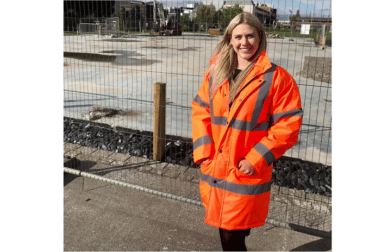Profile Interview: Ellie Maskrey, Quantity Surveyor

At BGEN, no two roles are the same, so we are talking to colleagues across the organisation and asking them five questions to get insight and understanding of their journey here and how they fit into the company.
Ellie joined BGEN this May as a Quantity Surveyor. She works predominantly on a large project with clients, AstraZeneca. She is passionate about construction and ambitious to become a Chartered Surveyor. In her spare time, she is a regular at CrossFit.
Can you tell us a little about your background and the path that has led you here?
I have always had an interest in the Property and Construction industries from a young age, as I have grown up around my father and uncle who are property developers and have inspired me a lot.
I studied Business Management at MMU achieving a First-Class degree, which I’m proud of. This helped me secure a job within a large company, my approach being that this would expose me to different roles and experiences.
I started out working in facilities management with Manchester Airport Group (MAG). This allowed me to work closely with other stakeholders within the business and I realised that I wanted to become a surveyor. An opportunity occurred to move into a quantity surveying role within MAG, and so I internally transferred into this role within the procurement department, as a client-side QS.
To further develop my career and work towards becoming chartered, I started studying towards a Master’s in Quantity Surveying whilst working full time.
I also need experience on both the client and contractor side of quantity surveying, so when the opportunity came up here at BGEN, I applied and was delighted to be offered the role – it’s a great team!
Sometimes it can seem like falling into a role, even though it’s not the case. I had tried other routes, but opportunities didn’t become available there, so it’s been partly good luck, and lots of perseverance.
What does your average day look like?
For most QS’s it varies – one day you could be in the office or working from home and the next on site, it would depend on the requirements of the project. The role is flexible with this aspect.
If I’m on-site, I’m attending client meetings or construction meetings, doing project progress walk-arounds to determine what stage the project is at for valuation, to ensure we recover the costs owed.
Through working on the contractor side, I have been exposed to high volumes of estimating, electrical, civil and building services through using the unit of measurements to quantify these costs. The main estimates are produced pre contract, though will be revised throughout.
Change management is a key part of my role. Variations (known as compensation events) occur daily, and our role is to ensure any changes to the contract are captured and additional costs are accounted for. I also have a lot of progress meetings with the construction teams.
I interact with the client PM and QS daily. A key skill I have developed is to build relationships with the client/contractor as this enables better collaboration on the projects, leading to increased success, especially when negotiating contracts and costs. As I came from the client side, that experience helps me build up mutual trust and understanding with the client.
Has anything taken you by surprise?
I’ve definitely noticed an increase of women in construction, which really surprised me. I have seen women in property, but I was surprised how many are now working in the construction industry. There is a better balance of diversity on both the client and contractor side, where I am based. There aren’t many women at all in the operational side, however, and I’d certainly like to see it increasing even more.
What do you see as biggest challenge?
Becoming a chartered surveyor without a RICs accredited degree: One of my biggest challenges of becoming chartered is that my Business Management degree is not RICS accredited and therefore I have had to take a longer route, undertaking a master’s part time, of two and a half years, and then on completion I need to complete the APC.
What advice would you give to someone setting out in their chosen career?
My advice is that if you have an ambition to get into property or construction, undertake a RICS accredited degree. There are apprenticeship routes available that I have seen young professional become very successful through. So, I would definitely suggest this route if there is an opportunity for it, as you will gain experience along side your degree.
However, on the flip side, don’t be discouraged from taking the longer route or harder route in order to pursue your ambitions. I looked at is as I’m always going to turn 30, so why not turn 30 qualified and closer to my goal?
